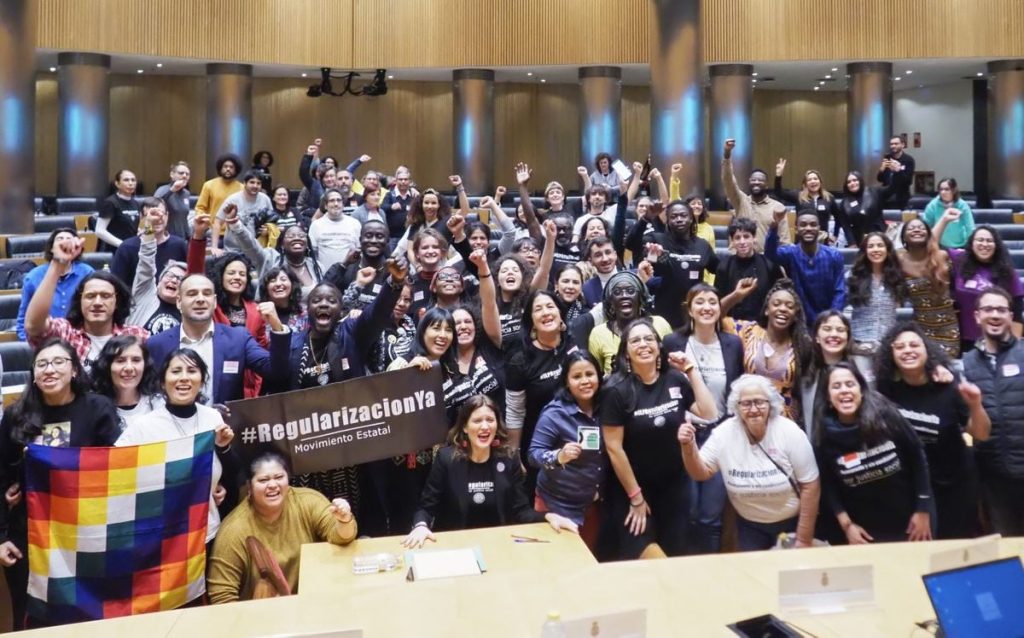The full Congress will vote on Tuesday on an initiative that will portray all political parties in a sensitive and increasingly crucial issue in each electoral appointment. After almost three years of deliberation, it is time to decide whether to consider the popular legislative initiative (ILP) that requests the regularization of hundreds of thousands of people who live—and work—without papers in Spain. The proposal arrives at the plenary with great uncertainty. During this time, the PSOE has moved from ambiguity to a yes, while the PP, which previously rejected addressing the issue, now leaves its vote open. Once again, Junts could be decisive. Beyond the substance of the issue, which can be nuanced with the corresponding amendments, the parliamentary processing of the initiative will allow for a more reflective debate on migration management in Spain, a slippery issue that fuels the far-right and evades the left. An issue that divides voters and is only discussed during crises.
The popular initiative, led by immigrants themselves through the Regularization Ya platform, reaches the chamber thanks to nearly 612,000 signatures (the law requires at least half a million) and the support of 906 organizations. The request has united municipalities, associations of prostitutes, and the Episcopal Conference in the same cause, although it has not garnered the support of the major trade unions. The request is to modify a transitory provision of the alien law, which was already used for another extraordinary regularization in 2000, during José María Aznar’s presidency. The demand is that in the new text it reads: “A procedure for the regularization of foreigners who are in Spanish territory before November 1, 2021, will be established within six months.” The promoters of the initiative estimate that the measure would benefit between 390,000 and 470,000 people, the majority from Latin America.
In a democracy, Spain has approved nine regularization processes for foreigners, five promoted by the Popular Party and four by the Socialist Party. The last one was in 2005 when the government of José Luis Rodríguez Zapatero granted papers to 600,000 non-EU workers. At the last minute on Monday, the promoters were confident that the ILP would finally progress. Vox will vote against, but the PP, which had previously shown reluctance, has not yet defined its position. Meanwhile, the PSOE has turned its ambiguity, leaning towards a no, into a likely yes, in line with all its government partners. Socialist sources have confirmed to EL PAÍS that they will vote in favor “out of respect” for the thousands of proponents from civil society, although they anticipate amending the content of the initiative.
Parties like Sumar, Podemos, ERC, IU, the PNV, and EH Bildu support the measure. Even Junts, which did not want to reveal its vote, hinted at a yes in the last Migration Commission meeting on March 12. “Our parliamentary group is very aware of the need to address this regularization, so we will participate with interest in the parliamentary debate on this initiative,” said deputy Josep María Cervera. The doubts within the PSOE ranks, which have been avoiding proposals of this kind for years, caused much concern among the organizations promoting the initiative. Until Monday, it was not clear that the Socialists would support it. What affects most is what happens closest. To stay informed, subscribe.
The Socialists have defended on several occasions that migration policy must be adapted to the European framework (a regularization in Spain would likely cause discomfort in several Member States). They have also used the argument that generalized regularizations are not allowed in the EU, although this is not exactly true. The EU Commissioner for Interior, Ylva Johanson, has stated in writing that the regularization of immigrants is a matter of national legislation. “The Commission recognizes that, in specific contexts [such as the pandemic], regularization can be an appropriate political response,” Johanson responded to a parliamentary question. The aspiration of this regularization is that it is massive, but if it finally happens, it will be subjected to debate and agreed-upon requirements.
The promoters argue for the measure to ensure adequate access to justice, health, education, and decent housing. They point out that one out of every three foreign people is at risk of severe social exclusion, a proportion three times higher than that of nationals. Irregularity also exposes the worker to exploitation. There are also economic arguments. The PorCausa foundation calculated that the contribution of regularized foreigners would result in a net accumulated benefit of between 790 and 950 million euros per year. If the initiative goes through, it will return to the Migration Commission for groups to submit their amendments, which will be voted on in Congress and later in the Senate. “If there is political will, this, which seems like a very long process, could be resolved in two months, and we would have a new law between September and December,” says Jorge Serrano, coordinator of the initiative. If it goes through, it will be a milestone. Since the approval of the Constitution, only 12 out of 179 initiatives presented (6.7%) have completed their parliamentary processing, according to a 2022 Newtral analysis. And of these, only two were approved: the recognition of bullfighting as cultural heritage in 2013, and the one that granted legal entity to the Mar Menor, in September 2022.


